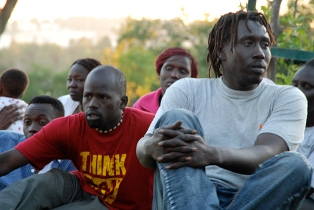Israel secretly deports Sudanese migrants
February 28, 2013 (LONDON) – The UN High Commissioner for Refugees has demanded that Israel provide an explanation for the secret deportation of more than 1,000 Sudanese migrants via a third country.

The story, first published in Israel’s English-language daily Haaretz on Tuesday, drew an outcry among human rights activists and politicians, with leader of the Israeli Labour Party, Shelly Yacimovich, describing the deportations as “immoral”.
MK Dov Khenin of the far left Hadash party called for deportations to be halted immediately and prime minister Benjamin Netanyahu to launch an investigation into who ordered the repatriation in the first place.
Israel had apparently attempted to protect the deportees by deporting them via an unnamed third country to conceal the fact that they came from Israel. The United Nations’ Refugee Agency (UNHCR) said it was not informed about the deportations, which were carried out without its coordination.
Sudan defines Israel as an enemy state and has warned that it will punish any of its citizens who travel there. Human rights groups say deportees may face imminent danger or even death once they are returned to their home countries, adding the decision constituted a violation of Israel’s most basic obligations under international law.
“In deporting [people] to Sudan, Israel has crossed a red line and is not only violating its most basic obligation under international law, but demonstrating cruelty, hardheartedness and indifference to the fate of human beings,” the Aid Organisation for Refugees and Asylum Seekers, said in a statement quoted in Haaretz.
Shahar Shoham, who heads the migrants department of Physicians for Human Rights, agreed that the deportees could not really be said to have acted out of their own free will.
“At our open clinic, we treat many who report daily anxiety, fear of walking down the street and suicidal thoughts,” she said. “Is this free choice? And more than that, is this the treatment and protection we as a state give to victims of torture, human trafficking and persecution?” he told Haaretz.
The UN’s position on voluntary repatriation to northern Sudan has been clearly put on record in the past. Michael Bavli, a senior adviser to the UNHCR, told the head of the Immigration Administration in 2008: “Deporting Sudanese to Sudan would be the gravest violation possible of the refugee convention that Israel has signed – a crime never before committed.”
Haaretz, which first broke the story, has repeatedly tried to obtain a response from attorney-general Yehuda Weinstein, but his office refused to comment Tuesday. No official response has been received from either the Israeli prime minister or interior minister Eli Yishai.
Aid groups estimate there are around 60,000 illegal African immigrants in the country, with the largest numbers coming from Sudan, Libya, South Sudan, Ethiopia and Eritrea. Most enter illegally and are fleeing poverty, armed conflicts, and governmental persecution over tribal or religious identity.
The Israeli government has recently taken a hardline stance against immigrants from Africa, with Netanyahu dubbing them a threat to state security. Many immigrants are threatened with indefinite jail terms if they refuse to voluntarily return to their home countries.
Last June, Al-Jazeera reported that 127 South Sudanese were airlifted to the South Sudanese capital, Juba, after an Israeli court found the asylum seekers were no longer at risk in their home country.
Deportees were reportedly told they could face jail or leave willingly with a $1,250 offering from the Israeli government.
The UNHCR spoke out against the issue of so-called voluntary return last October after it was revealed Eritrean citizens in custody were being made to sign forms indicating their “willingness” to return to their country of origin.
“As UN High Commissioner, we have access to the prison, and we heard what the state offered them. Agreement to return to Eritrea under an ultimatum of jail … can’t be considered voluntary by any criterion. It is explicitly not voluntary return,” UNHCR’s representative in Israel, William Tall, told Haaretz at the time.
(ST)
